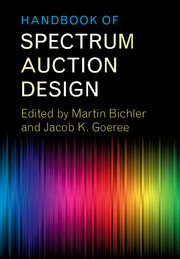Book contents
- Frontmatter
- Contents
- List of Contributors
- Preface
- List of Papers
- Part I The Simultaneous Multiple-Round Auction
- Part II The Combinatorial Clock Auction Designs
- Part III Alternative Auction Designs
- Part IV Experimental Comparisons of Auction Designs
- Part V The Bidders’ Perspective
- 31 Winning Play in Spectrum Auctions
- 32 Up in the Air: GTE's Experience in the MTA Auction for Personal Communication Services Licenses
- 33 Bidding Complexities in the Combinatorial Clock Auction
- 34 Strategic Bidding in Combinatorial Clock Auctions – A Bidder Perspective
- 35 Impact of Budget Constraints on the Efficiency of Multi-lot Spectrum Auctions
- Part VI Secondary Markets and Exchanges
- Outlook
- References
35 - Impact of Budget Constraints on the Efficiency of Multi-lot Spectrum Auctions
from Part V - The Bidders’ Perspective
Published online by Cambridge University Press: 26 October 2017
- Frontmatter
- Contents
- List of Contributors
- Preface
- List of Papers
- Part I The Simultaneous Multiple-Round Auction
- Part II The Combinatorial Clock Auction Designs
- Part III Alternative Auction Designs
- Part IV Experimental Comparisons of Auction Designs
- Part V The Bidders’ Perspective
- 31 Winning Play in Spectrum Auctions
- 32 Up in the Air: GTE's Experience in the MTA Auction for Personal Communication Services Licenses
- 33 Bidding Complexities in the Combinatorial Clock Auction
- 34 Strategic Bidding in Combinatorial Clock Auctions – A Bidder Perspective
- 35 Impact of Budget Constraints on the Efficiency of Multi-lot Spectrum Auctions
- Part VI Secondary Markets and Exchanges
- Outlook
- References
Summary
Introduction
Having advised mobile operators in a number of high-stakes spectrum awards, we offer a bidder's perspective on the challenges introduced by budget constraints in multi-lot auctions, and examine their impact on outcomes under the most prevalent formats.We consider in particular Combinatorial Auctions (CA), of which Combinatorial Clock Auctions (CCA) are a specific type, and Simultaneous Multiple Round Ascending Auctions (SMRA).
In contrast with SMRA, CAs involve a final sealed-bid round during which participants submit concurrent bids for different bundles or ‘packages’ of lots. The winning bids are selected such as to maximise the sum of corresponding bid values, under the proviso that each bidder wins at most one of its bids and that each lot is sold no more than once. Since each bidder either secures an entire package or nothing at all, there is no risk of winning and paying for an unwanted subset of a targeted allocation. This is a particularly attractive property, to which CAs must owe much of their popularity.
Furthermore, a generalised second-price rule is often applied, under which successful bidders pay no more than the minimum required to justify their allocation and to avoid ‘unhappy losers’. The latter entails prices such that given their bids, losers may be deemed ‘happier’ to forego goods than pay the higher amount needed to trump winning rivals. Ostensibly, this incentivises truthful bidding, which, in turn, enhances the prospects of directing the available goods to those who value them the highest.
In theory, therefore, second-price CAs simplify bid strategy while promoting efficiency. However, both of these advantages may be compromised if any of the participants are constrained by budgets rather than by their valuations for the goods on offer. Strict budget constraints may prevent bidders from expressing their relative preferences across the full range of packages of interest. This introduces a strategic dilemma. If they bid full value on smaller packages, such bidders will need to suppress marginal bid prices at the top end of the range to respect their budget limits. Doing so reduces the chances of winning a superior package. A constrained bidder may choose instead to create extra headroom by cutting bid prices at the lower end.
- Type
- Chapter
- Information
- Handbook of Spectrum Auction Design , pp. 764 - 782Publisher: Cambridge University PressPrint publication year: 2017
References
- 1
- Cited by



